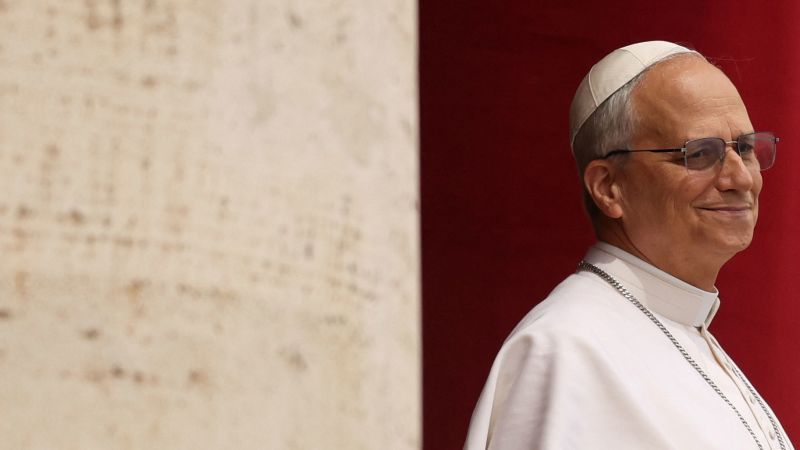Pope Leo XIII: His Role In Shaping The Modern Catholic Church

Welcome to your ultimate source for breaking news, trending updates, and in-depth stories from around the world. Whether it's politics, technology, entertainment, sports, or lifestyle, we bring you real-time updates that keep you informed and ahead of the curve.
Our team works tirelessly to ensure you never miss a moment. From the latest developments in global events to the most talked-about topics on social media, our news platform is designed to deliver accurate and timely information, all in one place.
Stay in the know and join thousands of readers who trust us for reliable, up-to-date content. Explore our expertly curated articles and dive deeper into the stories that matter to you. Visit Best Website now and be part of the conversation. Don't miss out on the headlines that shape our world!
Table of Contents
Pope Leo XIII: The Architect of Modern Catholicism
Pope Leo XIII (1810-1903), reigning from 1878 to 1903, stands as a pivotal figure in the history of the Catholic Church. His papacy, lasting a quarter of a century, witnessed profound social and political changes, and his responses shaped the direction of the Church well into the 20th and 21st centuries. This article explores his significant contributions to the modern Catholic Church, examining his key initiatives and enduring legacy.
Navigating the Challenges of Modernity
Leo XIII ascended to the papacy during a tumultuous period. The rise of nationalism, industrialization, and secularism posed unprecedented challenges to the Church's authority and influence. The unification of Italy had resulted in the loss of Papal States, significantly impacting the Pope's temporal power. Furthermore, the burgeoning socialist and Marxist movements presented a direct threat to the Church's social teachings.
Leo XIII responded with a strategic blend of traditionalism and adaptation. While firmly defending Catholic dogma, he recognized the need to engage with the modern world and address its pressing issues. This approach became the hallmark of his papacy and laid the groundwork for the Church's engagement with modern society.
Key Contributions of Leo XIII's Papacy
Several key encyclicals (papal letters) define Leo XIII's legacy:
-
Rerum Novarum (1891): This landmark encyclical, addressing the condition of the working class, is arguably Leo XIII's most significant contribution. It condemned both laissez-faire capitalism and revolutionary socialism, advocating for a "just wage," the right to form unions, and the importance of private property tempered by social responsibility. Rerum Novarum is considered the foundational document of Catholic social teaching and continues to influence ethical debates on economics and social justice. Learn more about the impact of Rerum Novarum .
-
Aeterni Patris (1879): This encyclical promoted the revival of scholastic philosophy, particularly the works of Thomas Aquinas, within Catholic theological discourse. Leo XIII believed that a renewed engagement with scholasticism would provide a robust intellectual framework for defending the Church's teachings against modern challenges.
-
Providentissimus Deus (1893): This encyclical emphasized the importance of biblical studies and encouraged scholarly engagement with the scriptures. This marked a significant shift towards more academic approaches within Catholic biblical scholarship.
Beyond Encyclicals: Other Significant Actions
Beyond his encyclicals, Leo XIII's papacy saw other significant developments:
-
The establishment of the Apostolic Constitution Pastoralis officii (1890): This document greatly strengthened the Church's missionary efforts, particularly in Africa and Asia.
-
Increased focus on education: Leo XIII championed the establishment of Catholic schools and universities, aiming to foster a more robust Catholic intellectual tradition.
-
Promotion of interfaith dialogue: While upholding Catholic doctrine, Leo XIII demonstrated a greater openness to dialogue with other religions, particularly Judaism.
The Enduring Legacy of Leo XIII
Pope Leo XIII's papacy was a complex and multifaceted period, marked by both challenges and triumphs. His willingness to engage with the modern world, while remaining steadfast in his faith, shaped the trajectory of the Catholic Church for generations to come. His emphasis on social justice, intellectual rigor, and missionary zeal continues to resonate within the Church today. His encyclicals, particularly Rerum Novarum, remain crucial texts for understanding Catholic social teaching and its ongoing relevance in addressing global inequality. The impact of Pope Leo XIII’s pontificate continues to shape the modern Catholic Church and its ongoing dialogue with contemporary society. Understanding his contributions is essential to understanding the Catholic Church's current engagement with social and political issues.

Thank you for visiting our website, your trusted source for the latest updates and in-depth coverage on Pope Leo XIII: His Role In Shaping The Modern Catholic Church. We're committed to keeping you informed with timely and accurate information to meet your curiosity and needs.
If you have any questions, suggestions, or feedback, we'd love to hear from you. Your insights are valuable to us and help us improve to serve you better. Feel free to reach out through our contact page.
Don't forget to bookmark our website and check back regularly for the latest headlines and trending topics. See you next time, and thank you for being part of our growing community!
Featured Posts
-
 The Best Weight Loss Drug Expert Review Of Leading Competitors
May 13, 2025
The Best Weight Loss Drug Expert Review Of Leading Competitors
May 13, 2025 -
 Childs Inadvertent Purchase The 4 200 Lollipop Order That Went Viral
May 13, 2025
Childs Inadvertent Purchase The 4 200 Lollipop Order That Went Viral
May 13, 2025 -
 Ufc 315 Montreal Event Review And Ppv Performance Analysis 2025
May 13, 2025
Ufc 315 Montreal Event Review And Ppv Performance Analysis 2025
May 13, 2025 -
 Rest For The Star Yankees Rising Star Out Of Mondays Lineup
May 13, 2025
Rest For The Star Yankees Rising Star Out Of Mondays Lineup
May 13, 2025 -
 Top Fantasy Baseball Performers 5 11 2025 Recap
May 13, 2025
Top Fantasy Baseball Performers 5 11 2025 Recap
May 13, 2025
Latest Posts
-
 Water Restrictions Force Ban On Tanker Deliveries To Us Billionaires Estate
Sep 13, 2025
Water Restrictions Force Ban On Tanker Deliveries To Us Billionaires Estate
Sep 13, 2025 -
 Star Trek Strange New Worlds Season 3 Finale Showrunner Interview Breakdown
Sep 13, 2025
Star Trek Strange New Worlds Season 3 Finale Showrunner Interview Breakdown
Sep 13, 2025 -
 Where Does Randy Orton Go After Wwe Retirement Exploring His Next Chapter
Sep 13, 2025
Where Does Randy Orton Go After Wwe Retirement Exploring His Next Chapter
Sep 13, 2025 -
 The End Of Restrictions How Wnba Players Won Style Autonomy
Sep 13, 2025
The End Of Restrictions How Wnba Players Won Style Autonomy
Sep 13, 2025 -
 Simple Solutions For Fussy Eaters Expert Guidance For Peaceful Meals
Sep 13, 2025
Simple Solutions For Fussy Eaters Expert Guidance For Peaceful Meals
Sep 13, 2025
